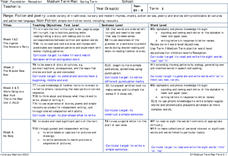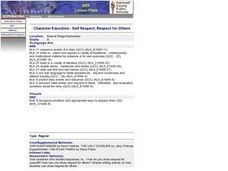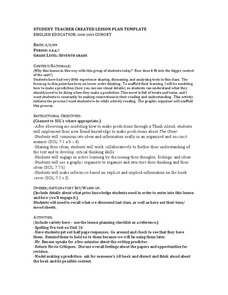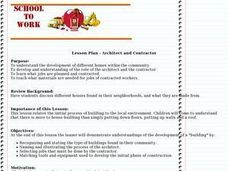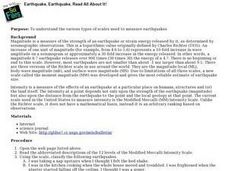Curated OER
Learning to Weave
Second graders discuss clothing and its relationship to weaving. They discuss changes in shopping since pioneer days. Students listen to a story about a mother and how she made clothes for her family. They create a weaving project.
Curated OER
Let's Roll Robots!
Learners write a story about robots. In this creative writing lesson, students read a story about robots, make their own robot, and write a story about their robot. In addition, the lesson plan suggests taking photos of the robots to add...
Curated OER
Discovering Shoes, Step by Step
Students discuss and write about their interpretations of the art. They compare and contrast the numerous types of shoes and how they are used in a certain time and place. Students memorize the Shel Silverstein's poem, "Ickle Me, Pickle...
Curated OER
Kindergarten Social Studies Lesson 4
Students examine the lives of children in other places. They listen to a read aloud of Eve Bunting's, Dandelions, and retell the story of the family living in the West. They talk about the sod houses and compare them to the types of...
Curated OER
Loving Literature
First graders, after having "Are You My Mother?" by P.D. Eastman read to them, participate in group discussions or independentally work to analyze a spreadsheet to identify essential elements in the story and graph their data. In...
Curated OER
Fiction and Poetry
Students explore fictional text and poetry. They explore the story structures used in the types of texts and examine the language patterns used. Students practice tracking text in the correct manner.
Curated OER
The Little Engine That Could
Students read the story The Little Engine That Could and read companion stories, predict in a chart, work with rhyming and word families, and more. For this reading lesson plan, students take 5 days to read the book.
Curated OER
Character Education - Self Respect, Respect for Others
Students respond the story of Chrysanthemum by Kevin Henkes and discuss the ways in which she showed respect for herself and for others.
Curated OER
The Giver
Middle schoolers read the novel The Giver and complete six tasks. They identify vocabulary that they did not recongize, create a different ending for the book, produce character cards and pick important events and objects from the novel.
Curated OER
Proofreading and Revising Articles for a Class Newsletter
Students submit their newsletter articles and a newsletter team proofreads them. Revisions are suggested. Writers revise their articles. Using a template from a word processing program, articles are typed in final form.
Curated OER
Lucy the Changing Ladybug
Students listen as the teacher reads "Lucy the Changing Ladybug." Students use construction paper to create a large leaf which they divode and number four sections. Each section will be illustrated to represent one stage of a ladybug's...
Curated OER
Let's Read with Expression!
Students review the concept of expressive reading. Through modeling the teacher shows them that more expression makes reading more interesting and enjoyable to listen to. They review ending punctuation marks and the types of expression...
Curated OER
The Giving Tree Gives
Students study both poetry and science in this language arts activity for early elementary, Special Education, and LEP students. They listen to Shel Silverstein's, The Giving Tree, and discuss its contents. They graph apple types, make...
Curated OER
Fantasies and Myths
Fourth graders examine different types of literature, specifically myths and fantasy. They listen to "The Giving Tree", identify in which genre of literature it belongs, and view several myths on a website. At end of lesson, 4th...
Curated OER
Introduction to Bats
Students read about bats and discuss what they learn. In this bats lesson plan, students read stories about bats and discuss what they learned. Students work in groups to brainstorm what they know about bats and make a list...
Curated OER
Understanding and Writing Fables
Third graders review with the teacher the characteristics for a fable and what it is. They read one paragraph each from the story, "The Fox and the Stork" aloud. They then answer comprehension questions aloud. Next, they listen to four...
Curated OER
Book Week Campout
Learners end the celebration of Book Week in their gym class. As a class, they follow directions to move along with a song and how to use their stuffed animals to move to the music. To end the instructional activity, they participate in...
Curated OER
ReQuest and Motor Imaging with My Side of the Mountain
Fifth graders read "My Side of the Mountain." They create a pantomime using vocabulary words from the story. Students create three questions about the reading. They discuss the passage they read and act out words to help them better...
Curated OER
Architect and Contractor
Students recognize and state the type of buidings found in their community. They name and illustrate the process of the architect. They match tools and equipment used to develop the initial phase of construction.
Curated OER
Identifying Irony
In this identifying irony worksheet, 9th graders read 6 paragraphs, identify the type of irony being used (dramatic, situational, verbal) and explain their answer.
Curated OER
First-Aid and Emergencies
Students complete a pre-test to determine what they already know about what to do in an emergency. In groups, they read real-life scenerios and decide what the proper way to handle the situation. To end the lesson, they present their...
Curated OER
What Are Maps For?
Learners create a story about a problem someone could have which could be solved by the use of a map. They complete a worksheet that guides them through the features of a map of Chicago. Then they calculate story problems using the...
Curated OER
Earthquake, Earthquake, Read All About It!
Young scholars utilize the U.S. Geological Service web site. They research the various types of scales used to measure earthquakes and classify different situations on the scale. They write a story about a town that has just experienced...
Curated OER
Frankenstein
Young scholars use an outline of the story "Frankenstein" to identify mistakes in English. They practice making corrections to make the sentence correct. They answer questions to end the lesson.





